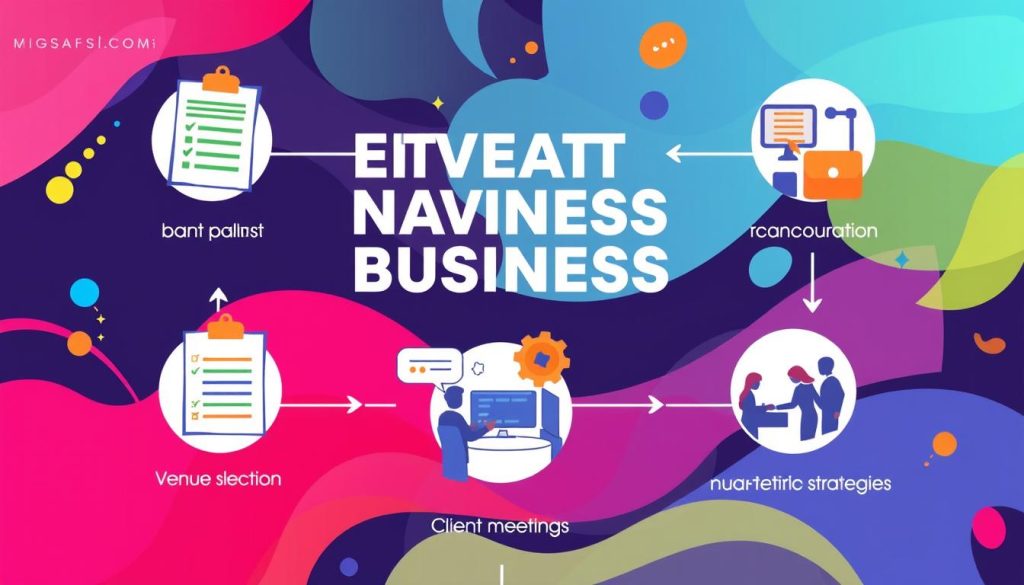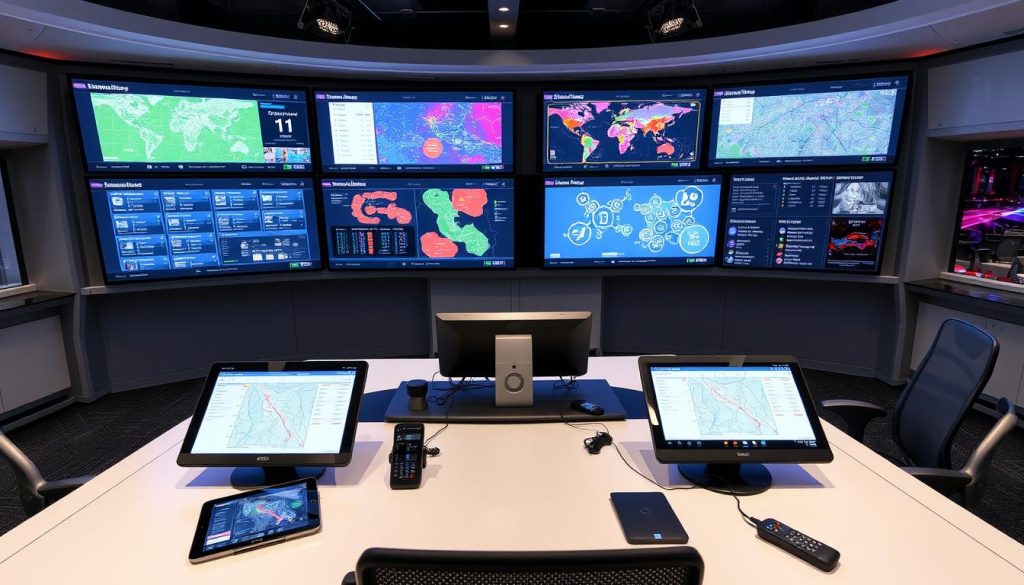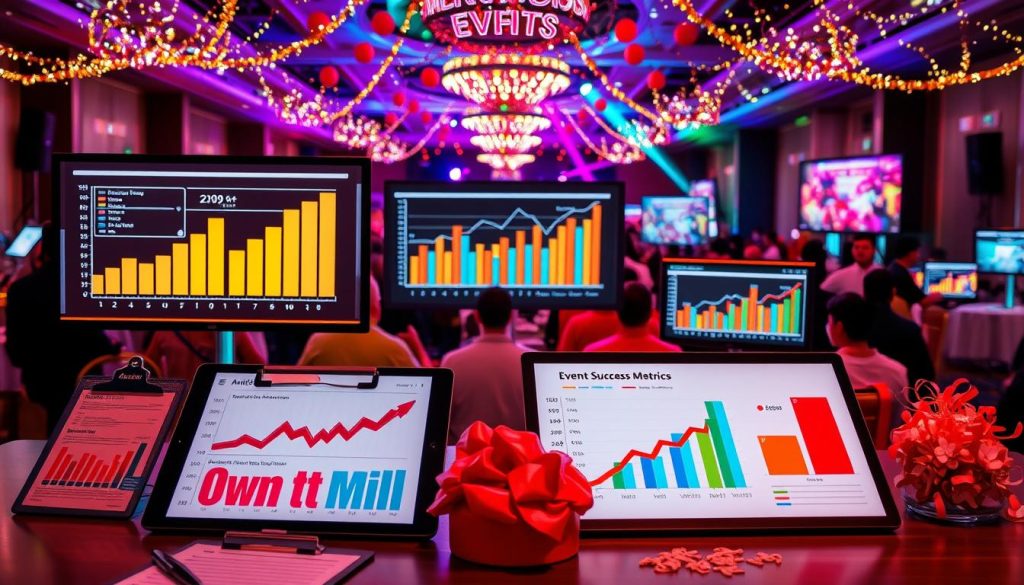The event management business is a vibrant and complex field. It’s key to planning many special events in the UK. Event planners and organisers work hard to make sure events like corporate gatherings, weddings, festivals, and public events go well from start to finish.
This job requires great planning skills, creativity, and the ability to handle crises. The event industry is getting bigger, which means more people are needed who can create amazing experiences. These experiences make a big difference in our society.
Understanding the Event Management Industry

The event management industry has grown a lot in recent years. It covers many activities. Knowing how it works is key for those wanting to join this field. The event lifecycle has four main stages: planning, coordination, execution, and assessment. Each stage needs a lot of attention to do well.
Now, there’s a big push for events that feel more personal. This shows how important it is to know what people want. Technology is also big in events today, making them more interactive and engaging. And, events are getting greener, showing we care more about the planet.
Events happen in many areas like corporate, social, and public ones. Each area has its own set of challenges. You need to know about rules, budgets, and working with different people. Knowing these things makes events better and helps the event management industry succeed.
Key Services Offered in Event Management

Event management offers a variety of services for different events. These services are designed to meet the unique needs of each event type. Whether it’s corporate events, weddings, or public events, each one requires a special approach for success.
Corporate Events
Corporate events are crucial for businesses to build relationships and boost their brand. They cover conferences, product launches, and team-building exercises. The main focus is on expert event management, handling logistics, and setting up networking chances for guests.
Weddings
Weddings are big personal events needing careful planning and detail. Services include picking the venue, arranging food, and setting up the décor. The goal is to match the couple’s dream while making the event run smoothly.
Festivals and Public Events
Festivals and public events aim to bring communities together and entertain them. They require a lot of planning, working with local authorities and vendors. The aim is to give everyone a memorable time.
Importance of Professional Event Planners

It’s vital to work with professional event planners for a successful event. They have the skills to handle various challenges and make sure every detail matches the client’s vision. They are great at keeping to budgets and timelines, which are key to an event’s success.
Professional event planners have a wide network of suppliers and vendors. This helps them negotiate better and saves time. It also improves the quality of events. They manage relationships with stakeholders well, leading to better teamwork and resource use.
They are experts in organisation and coordination. They can predict and plan for unexpected problems, reducing disruptions during the event. They also keep up with the latest trends and technologies, making events more valuable and memorable for guests.
Professional event planners make sure attendees are happy. Well-run events lead to positive experiences that make people want to come back. Hiring them lowers the risks of planning and helps create events that really connect with people.
Steps to Start an Event Management Business

Starting an event management business needs careful planning and a clear strategy. Knowing the key steps helps new entrepreneurs deal with the industry’s challenges.
Market Research and Planning
Good market research is crucial for a successful event planning business. It starts with finding out who your customers might be. Then, looking at what others do helps you understand the market better.
Spotting what’s missing in the market lets you offer something new. This research helps create a detailed business plan. It outlines goals and how to achieve them, guiding your new business.
Building a Reliable Supplier Network
Having a strong supplier network is key in event management. It means working with venues, caterers, and others to make events run smoothly. Good partnerships boost your business’s reputation and how well it operates.
Spending time on these relationships improves your service quality. This ensures your events go off without a hitch.
Event Management Strategies for Success

Effective event management strategies are key to a successful event. Detailed planning is essential, covering theme development, audience engagement, and backup plans. Understanding how to engage stakeholders leads to better teamwork and results.
Good event planning means looking at what the audience needs. This might mean:
- Creating themes that really speak to the audience
- Using different marketing channels to get the word out
- Building a welcoming space that gets people involved
Keeping everyone involved in the event process helps meet goals. Checking in after the event gives insights into what worked well and what didn’t. This focus on ongoing improvement helps event planners do even better next time.
Latest Trends in Event Management

The world of event management is always changing. It shows the newest trends that reflect new technology and what people want. Now, events often use virtual and hybrid formats to reach more people and keep them engaged. There’s also a big push for sustainability in events, thanks to more awareness about the environment.
Virtual and Hybrid Events
Virtual events are getting more popular because they’re flexible and easy to get into. People can join from anywhere, which helps organisers draw in a global crowd. Hybrid events mix the real and the online, letting people be there in person and still use digital tools. This way, everyone can take part in things like live polls, Q&A, and chats.
Eco-Friendly Practices
Now, making events sustainable is a must for many planners. By choosing eco-friendly options, event managers can cut down on their environmental impact and attract those who care about the planet. Some ways to do this include:
- Using local materials to cut down on emissions from transport
- Starting waste reduction projects
- Pushing for recycling and composting
- Switching to digital tickets to use less paper
Essential Skills for Event Managers

Being good at event management means having a wide range of skills. You need strong organisational skills to keep everything running smoothly. It’s also key to have great communication skills to work with different people and make sure everyone knows what to do.
Being able to solve problems is important when unexpected things happen on the day of the event. This skill helps you handle any last-minute issues.
Managing your time well is crucial for sticking to tight schedules and hitting deadlines. This helps make sure your event planning goes off without a hitch. Being creative helps you come up with unique ideas that make your events stand out and leave a lasting impression.
Knowing how to handle budgets and finances is a must. It ensures your events stay within budget and offer great value to everyone involved.
Event Management Technologies and Tools

Event management technology has changed how we plan and run events. Now, planners can make processes smoother, improve how people engage, and check how well events do.
Event Management Software
Event management software is key for today’s event planning. It makes tasks like signing up, selling tickets, and managing projects easier. This tech saves time and cuts down on mistakes.
It also gives strong data analysis. This helps measure event success by looking at what attendees say and how they engage. Tools like Eventbrite and Cvent help with planning and promoting events well.
Social Media in Event Promotion
Social media is vital for promoting events. Sites like Facebook, Twitter, and Instagram are great for reaching out to people. With smart social media plans, event organisers can build excitement, share updates, and talk to their audience.
This not only makes events more visible but also helps build a community around them. This leads to more people coming to the event.
Event Management Best Practices

Using the best event management practices is key to a successful event. Good budget and risk management can make event planning more efficient.
Budget Management
Managing your budget well is crucial for a successful event. It means keeping track of all costs and incomes to make sure you’re making money. Important steps include:
- Creating a detailed budget plan that covers all costs, like venue, food, and advertising.
- Talking to suppliers to get the best deals and terms.
- Finding ways to save money without lowering quality, like using local suppliers.
- Checking financial forecasts and spending regularly to stay on track.
Risk Management Strategies
Good risk management is key to spotting and fixing problems early. Here are some tips:
- Doing a detailed risk check to find out what could go wrong, like logistical issues, health and safety problems, and financial risks.
- Having backup plans for any problems to keep the event running smoothly.
- Keeping everyone informed about what’s happening and any issues that come up.
- Updating risk management plans as things change.
Event Management and Marketing Integration

Combining event management with effective marketing is key to event success. Using integrated marketing strategies helps match event themes with the brand message. This makes the event experience cohesive and boosts brand awareness.
A good event promotion plan uses many channels to reach potential attendees. Important methods include:
- Social media campaigns to create excitement and draw in people.
- Email marketing for updates and to build excitement.
- Direct marketing for reaching specific groups of people.
Keeping the message consistent across all promotional channels helps it stick with the audience. After the event, using analytics can show what attendees liked and what they didn’t. These insights are very useful for planning future events.
Understanding Event Stakeholders

Knowing who is involved in an event is key to its success. This means understanding the roles of sponsors and partners, and how to engage attendees well.
Sponsors and Partners
Sponsors and partners are crucial for an event’s success. They provide funding and resources. It’s important to manage these relationships well to make sure everyone gets value.
Creating strong value propositions helps match what sponsors want with the event’s goals. This builds lasting partnerships.
Attendee Engagement
Getting attendees involved is all about giving them memorable experiences. Event managers should plan interactive activities, send targeted messages, and follow up after the event. These steps make attendees happy, loyal, and more likely to come back.
Event Management: Measuring Success

It’s crucial to measure event success for better planning. Getting feedback from attendees, staff, and sponsors is key. Using feedback tools helps us understand what people thought and how happy they were. This info is vital for checking how well an event did.
Feedback and Evaluation
Surveys and questionnaires are great for getting feedback. They give us both numbers and stories. This tells us what went well and what could be better. Open-ended questions give us deep insights, while numbers like attendance and costs show how successful an event was.
These evaluations help us make each event better for the next one.
Key Performance Indicators (KPIs)
Setting clear event KPIs is key. Important ones include return on investment, how engaged people were, how many more came, and how happy they were. Tracking these helps us make smart choices based on facts.
This way, we can make future events even better. It makes sure they meet everyone’s expectations.
The Role of Networking in Event Management

Networking is key in event management for building strong professional relationships. These connections with vendors, clients, and peers are vital for success. They offer access to resources and insights on new trends.
Good networking opens doors for partnerships and collaborations. At industry conferences, event managers can meet potential clients and talk about their work. Being active in local events helps strengthen these connections, which is good for business growth.
Using social media for event professionals can boost networking too. Sharing experiences and insights helps event managers stand out. This can lead to more business chances. A strong network makes services better, increases visibility, and improves event quality.
Challenges Faced in the Event Management Business
The event management business faces many challenges. Budget issues are a big problem, as planners work with limited funds to achieve great results. Fluctuating demand also makes planning hard, so event managers must be quick to adapt.
Creating unique and memorable events is a big challenge. It needs innovative ideas and deep market research to make events stand out. Unforeseen problems like bad weather, venue issues, or global crises can also disrupt events. Having strong crisis management skills is key to handling these issues and protecting the event’s reputation and the client’s investment.
To overcome these challenges, event managers must keep learning and adapt to new trends. Being resilient and proactive helps them not just survive but also succeed in a tough market.
















